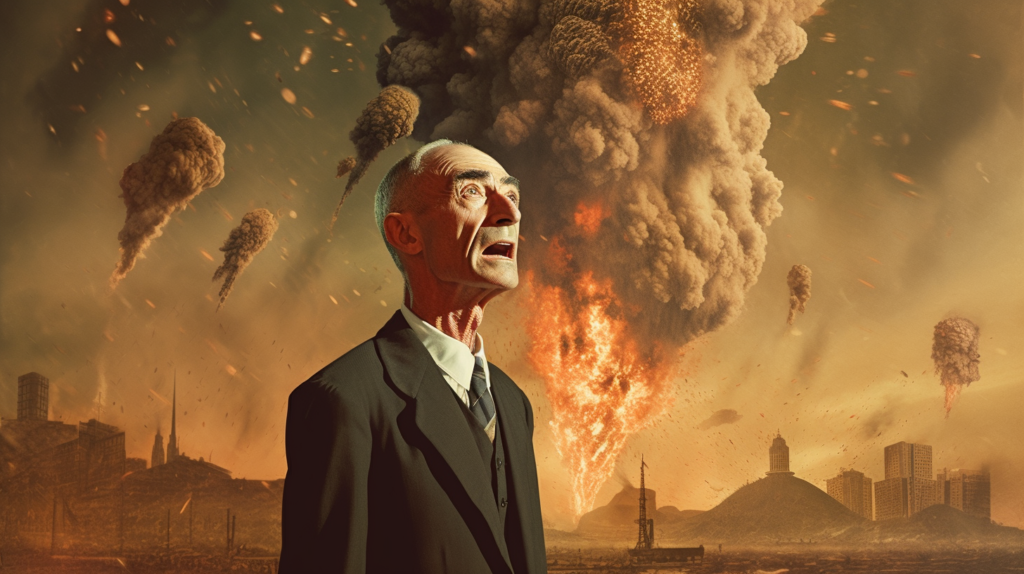J. Robert Oppenheimer: Unveiling the Enigma through Christopher Nolan’s Cinematic Lens
Imagine the visionary filmmaker Christopher Nolan, renowned for his mind-bending narratives and intricate character explorations, embarking on a cinematic journey to unravel the complex life and legacy of J. Robert Oppenheimer. In this hypothetical collaboration, Nolan’s masterful storytelling would undoubtedly challenge our perceptions and ignite introspection. However, as we immerse ourselves in Nolan’s cinematic realm, it is essential to remember that while his directorial prowess may influence our emotions, we must remain resolute in our own opinions on the contentious question at hand: Is J. Robert Oppenheimer a hero or a villain? Let us embark on this imaginative odyssey, steadfast in our convictions, ready to confront the enigma that lies within Oppenheimer’s story.
In the annals of history, few figures evoke as much debate and introspection as J. Robert Oppenheimer, the brilliant physicist known as the “father of the atomic bomb.”
Oppenheimer’s involvement in the development of this devastating weapon raises profound questions about the nature of heroism and the moral complexities of scientific advancement. In this blog post, we delve into the contrasting arguments surrounding Oppenheimer’s legacy, exploring the case for both heroism and villainy.
Heroic Argument:
- Scientific Brilliance: Oppenheimer’s contributions to theoretical physics and his profound understanding of quantum mechanics place him among the intellectual elite. His genius and groundbreaking research laid the foundation for future scientific advancements.
- Ending World War II: As the leader of the scientific team behind the Manhattan Project, Oppenheimer played a pivotal role in the development of the atomic bomb. The bombings of Hiroshima and Nagasaki, while tragic, hastened Japan’s surrender, potentially saving countless lives that would have been lost in a prolonged conflict.
- Moral Reflection and Advocacy: Oppenheimer’s remorse and moral reflection following the war highlight his profound awareness of the destructive power unleashed. His subsequent advocacy for international control and disarmament demonstrates a sense of responsibility and a commitment to preventing future harm.
The Villain Argument
- Moral Responsibility: Critics argue that Oppenheimer’s involvement in the creation of the atomic bomb makes him complicit in the immense loss of civilian life and suffering caused by the bombings. They question the morality of intentionally developing such a devastating weapon.
- Humanitarian Alternatives: Opponents suggest that alternative approaches, such as a demonstration or more targeted military strikes, could have achieved similar results without inflicting massive civilian casualties and long-term radiation effects.
- Nuclear Arms Race: Critics highlight the risks and tensions resulting from the atomic bomb’s development, leading to the subsequent nuclear arms race and the ongoing threat to global security.
J. Robert Oppenheimer’s legacy embodies the profound moral dilemmas faced by individuals tasked with creating powerful weapons. While his scientific brilliance and instrumental role in ending World War II are commendable, the ethical considerations surrounding the atomic bomb cannot be overlooked. Oppenheimer’s subsequent reflections and commitment to preventing future harm showcase his heroic intent, even in the face of complex and morally challenging circumstances. Ultimately, whether we perceive him as a hero or a villain depends on the lens through which we examine his story and the weight we assign to the various arguments and counterarguments presented.
Now coming to Nolan
His Penchant for Complexity: Christopher Nolan’s films are renowned for their intricate narratives, thought-provoking themes, and layered character portrayals. His ability to delve deep into the psyche of his protagonists creates a fertile ground to explore Oppenheimer’s complexities and challenge conventional notions of heroism and villainy.
Narrative Puzzle Pieces: Nolan’s signature nonlinear storytelling and intricately woven plotlines would lend themselves beautifully to capturing the multifaceted nature of Oppenheimer’s life. With each piece of the puzzle unveiled, Nolan could delve into the brilliant mind, moral dilemmas, and haunting consequences of Oppenheimer’s scientific achievements.
Navigating Our Perspectives:
Maintaining Personal Convictions: As we enter Nolan’s immersive cinematic universe, it is vital to remember that his artistic interpretation may sway our emotions and present new angles to consider. Yet, we must remain steadfast in our own convictions, staying true to our individual assessments of Oppenheimer’s character and his role in history.
Exploring the Ethical Spectrum: Nolan’s storytelling prowess may shed light on the ethical quandaries faced by Oppenheimer, challenging us to confront the moral repercussions of his scientific brilliance. By delving into the conflicting forces at play, we can engage in a nuanced exploration of Oppenheimer’s actions and their impact on the world.
As Christopher Nolan takes us on a journey through Oppenheimer’s enigmatic life, we must remember that his cinematic interpretations are but one prism through which to view this complex figure. We must stay resolute in our own assessment, untangling the threads of Oppenheimer’s story while confronting the ethical dilemmas he confronted. In the end, it is our responsibility to navigate the intricate depths of his legacy, shaped by our own convictions, and determine whether he emerges as a hero or a villain in the annals of history.
